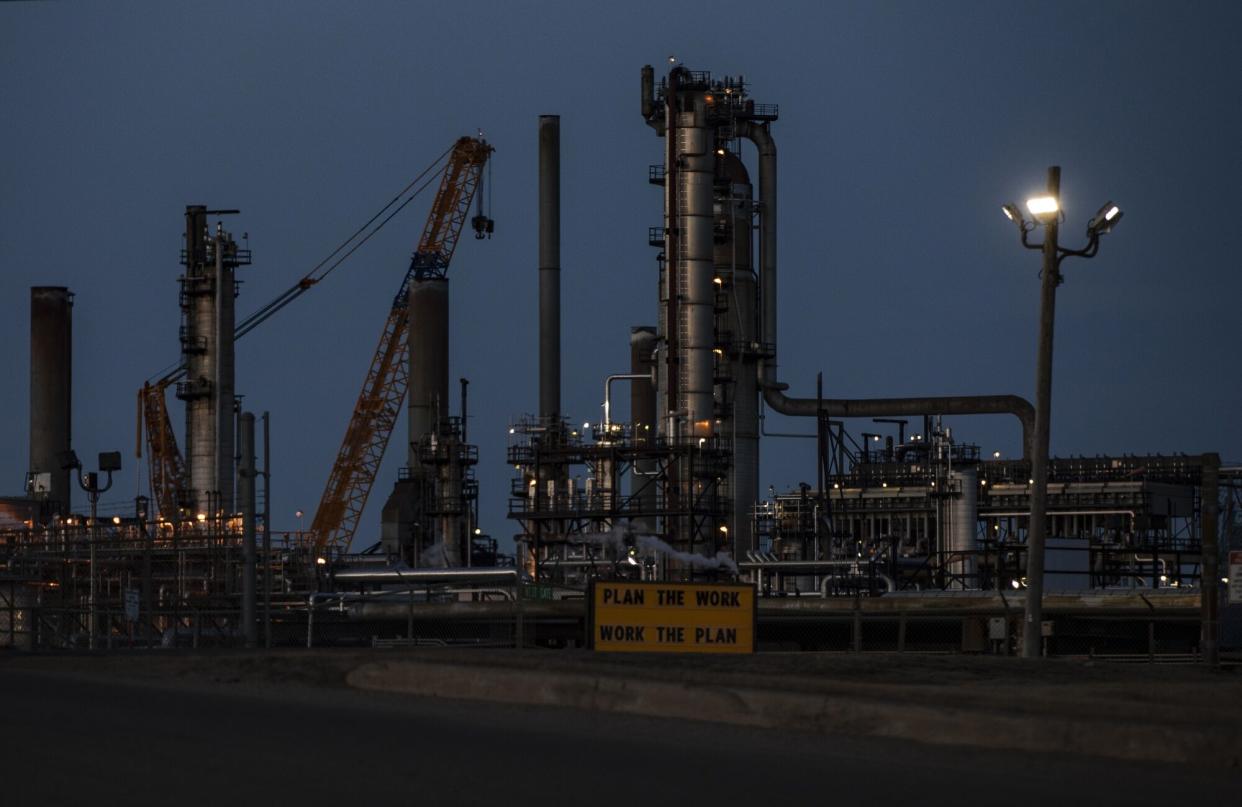Canada to Curb Oil, Gas Emissions With Cap-and-Trade Regime

(Bloomberg) -- Canada plans to limit emissions from the country’s oil and gas industry using a cap-and-trade system, a policy that will become a cornerstone of Prime Minister Justin Trudeau’s efforts to help curtail global warming and is almost certain to meet resistance in the western provinces.
Most Read from Bloomberg
Elon Musk's SpaceX Valued at $175 Billion or More in Tender Offer
Tech Storms Back as AI Powers Nasdaq 100 Rebound: Markets Wrap
Apple Readies New iPads and M3 MacBook Air to Combat Sales Slump
Harvard, Penn Heads Walk Back Genocide Answers After Backlash
Environment Minister Steven Guilbeault is set to announce the new energy-sector emissions rules on Thursday at the COP28 climate summit in Dubai, according to people familiar with the plan, asking not to be named because the matter is still private. Energy and Natural Resources Minister Jonathan Wilkinson will participate in the announcement from Ottawa.
The plan may draw condemnation and legal challenges from Alberta and Saskatchewan, the two provinces that produce the vast majority of the country’s oil and gas. Canada is the world’s fourth-largest oil producer, and Alberta’s oil sands are the world’s third-largest reserve of crude.
The federal government crafted the policy after consulting with industry, environmental and Indigenous groups and provincial governments, one of the people said. It will take effect in 2030, requiring a significant emissions cut that year. The cap will be lowered in stages over the following 20 years until the sector reaches net zero in 2050.
The exact cut required in 2030 isn’t yet known, but one of the people said it wouldn’t be as stringent as the 42% originally proposed in an earlier emissions reduction plan. Another person said it would be a range rather than a hard target. The government will allow oil and gas producers to buy carbon offsets or pay into a technology fund if their emissions exceed the cap, the person said.
The plan, which is key to Trudeau’s goal of cutting emissions by 40% to 45% from 2005 levels by 2030, was first reported by The Globe and Mail.
Trudeau first promised the emissions cap in the 2021 election campaign, and Guilbeault has pushed back its release schedule several times. The announcement on Thursday will be a framework outlining the plan, with full draft regulations to be published later, the people said.
One of the people familiar with the announcement stressed that it is about reducing emissions rather than cutting production. While the government is unlikely to announce new funding on Thursday, it has already pledged C$12.4 billion ($9.1 billion) in tax credits for building carbon capture systems and will soon introduce legislation establishing those credits.
Read More: Trudeau Bets $9 Billion on Plan to Clean Up World’s Dirtiest Oil
The person also said the emissions cap is also about ensuring Canadian industry remains competitive in an economy where demand for lower-emitting energy sources is expected to rise.
Trudeau’s Liberal government has often been at odds with the oil and gas industry, dating back to his rejection of a key crude pipeline to the country’s Pacific Coast in 2016 and comments that he made the following year that the country needs to “phase out” the high-emitting oil sands.
Alberta Premier Danielle Smith has vowed to defy both the federal government’s clean-electricity regulations, which aim to create a net-zero grid by 2035, and new methane rules that Guilbeault just announced at COP28. Last week, she invoked a measure to defy federal regulations that aim for a net-zero electrical grid by 2035, almost certainly setting up a court battle.
Smith said Wednesday on CTV News that she would wait to hear the details of the government’s emissions cap but added, “If an emissions cap is so stringent that it will shut in production, we won’t let that happen.”
The antipathy between the industry and the federal government even dates back to the administration of Trudeau’s father, Pierre Trudeau, who introduced a plan in the 1980s to increase Canada’s ownership of the sector and guarantee supplies and prices for the country.
Still, Trudeau has often helped the industry, which typically accounts for about a fifth of the country’s exports, in ways that have weakened his support among environmentalists. His government in 2018 bought the Trans Mountain oil pipeline for C$4.5 billion ($3.3 billion) to save a key expansion project from cancellation. The price tag for the line has since swelled to more than C$30 billion.
--With assistance from Robert Tuttle.
(Updates with Alberta premier’s comments in 12th paragraph)
Most Read from Bloomberg Businessweek
Salesforce Signals the Golden Age of Cushy Tech Jobs Is Over
How the Biggest Boutique Fitness Company Turned Suburban Moms Into Bankrupt Franchisees
Hottest Job in US Pays $80,000 a Year, No College Degree Needed
After So Many False Dawns, the Market Is Convinced the Fed Will Finally Cut
SpaceX’s Colossal Starship Sets Pace in Race to Build Larger Rockets
©2023 Bloomberg L.P.



